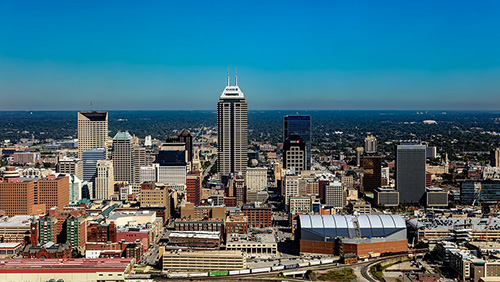Indiana has become the latest state officially get its sports gambling industry off the ground. Three casinos in the state unveiled their sportsbooks this past Sunday, with Governor Eric Holcomb on hand at one to place one of the first wagers in the state. While just three operators went live that day, others are following quickly and there will ultimately be ten casinos and three off-track locations that will take sports wagers.
 The first three to get going after receiving approval by the Indiana Gaming Commission (IGC) are Ameristar Casino in East Chicago, Hollywood Casino in Lawrenceburg and Indiana Grand Racing & Casino in Shelbyville. Tomorrow, Horseshoe Hammond should be ready to turn on its sportsbook operations and French Lick Resort will be the next, getting in on the action this Friday.
The first three to get going after receiving approval by the Indiana Gaming Commission (IGC) are Ameristar Casino in East Chicago, Hollywood Casino in Lawrenceburg and Indiana Grand Racing & Casino in Shelbyville. Tomorrow, Horseshoe Hammond should be ready to turn on its sportsbook operations and French Lick Resort will be the next, getting in on the action this Friday.
Holcomb approved sports gambling legislation this past May, leading to the IGC beginning to accept sports gambling licenses at the beginning of July. As applications have been submitted and approved, venues have had their operations tested to ensure compliance and, if all requirements are met, are allowed to introduce sports gambling.
The governor dropped in on the Indiana Grand to help inaugurate the casino’s new sportsbook. He placed a modest $10 wager for the Indianapolis Colts to take this season’s Super Bowl, and another $10 on the Indiana Pacers taking the NBA Championship. Hopefully he has better insight for the NFL and the NBA, as a third $10 bet placed on the Indiana Fever of the WNBA beating the Minnesota Lynx came up short when the Lynx won 81-73.
Indiana has a sports gambling framework that is more robust than some other states. As has been seen in places like New Jersey and Rhode Island, bets on all major league activity and professional sports like golf, soccer, tennis, darts and others are allowed. In contrast to some states, though, Indiana also allows wagers on college sports. High school and amateur sports contests are virtually the only two groups excluded from the state’s new sports gambling laws.
The cost for getting in on the action is not unreasonable in Indiana. The initial fee is $100,000 and an annual payment of $50,000 is needed to renew the license. In addition, sportsbooks have to give up 9.5% of their gross gaming revenue to the state’s taxman. This money goes to support problem gambling initiatives, as well as for Indiana’s general fund.